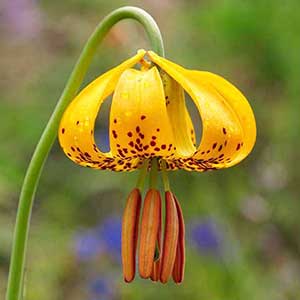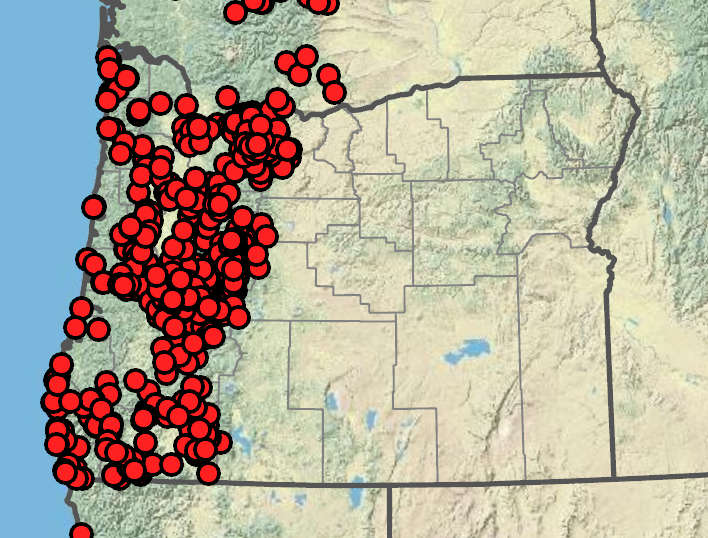Lilium columbianum
Lilium iridollae
Columbia lily, Oregon lily, tiger lily
in 1–9 whorls, generally ascending, weakly oblanceolate to obovate, 1.5–16 cm;
margin generally wavy.
flowers 1–25(45), pendent to nodding.
widely bell-shaped, not fragrant;
perianth segments 3.4–6.1(7.1)cm, orange (sometimes reddish outside);
distal 50–60% portion reflexed;
stamens longer than perianth;
filaments spreading;
anthers 5–13 mm; yellowish to very pale magenta;
pollen orange or yellow;
pistil 2.4–3.7 cm.
2–5.4 cm.
=24.
Lilium columbianum
Lilium iridollae
Dry scrub, coastal prairie, gaps and roadsides in conifer forest especially along coast. Flowering May–Aug. 0–2000m. Casc, CR, ECas, Est, Sisk, WV. CA, ID, WA; north to British Columbia. Native.
This widespread lily is rather variable. Oregon plants tend to have exserted stamens and the “Turk’s-cap” flower form associated with large butterfly pollination. Patches of flowering plants can be thick with western tiger swallowtails and pale swallowtails. Lilium columbianum hybridizes with L. pardalinum ssp. wigginsii and vollmeri, and extensively with L. occidentale in southern coastal Oregon. Lilium columbianum may intergrade with L. kelloggii along Highway 199 at the border between California and Oregon; these plants are slightly fragrant and the bulb scales unsegmented, all characteristics of Kellogg’s lily. Native Americans used Lilium columbianum bulbs as a food or peppery condiment. For many, it was a staple food (Pojar and MacKinnon 1994).
Mark Skinner
- Local floras:
BC,
CA,
OR,
WA
- Local Web sites:
CalFlora,
CalPhotos,
Flora NW,
PNW Herbaria,
Turner Photog.
WildflowerSearch
iNaturalist (observations)
USDA Plants Database
- LBJ Wildflower Center
- SEINet
- Plants of the World Online
- Encyclopedia of Life
- Wikipedia
- Google Image Search



